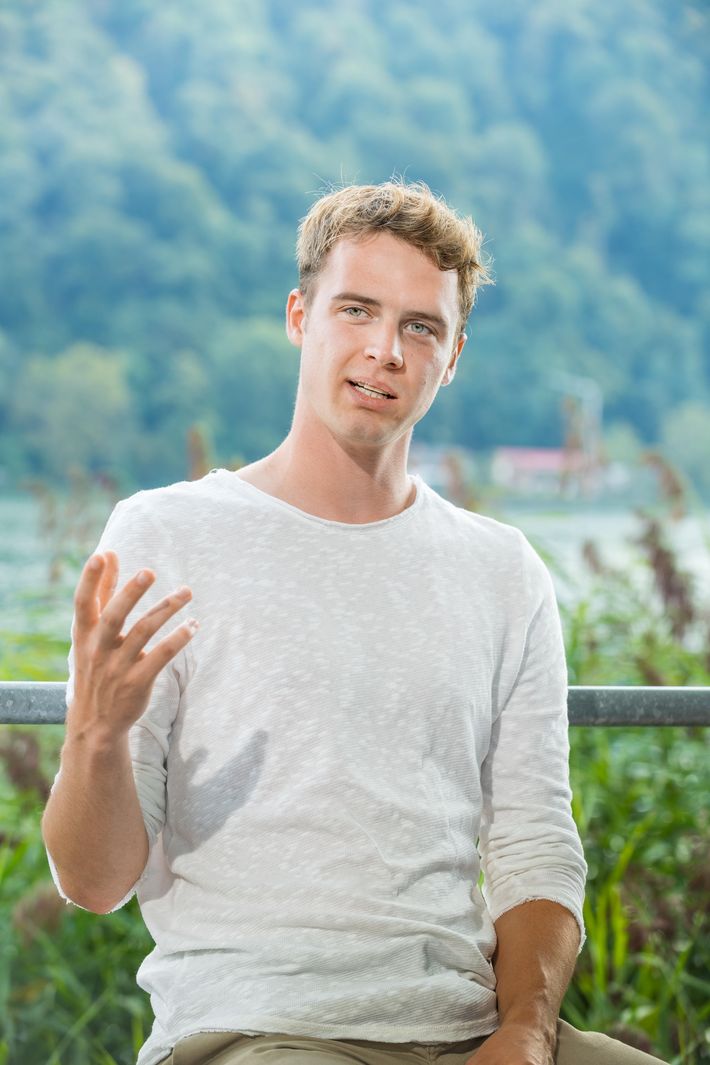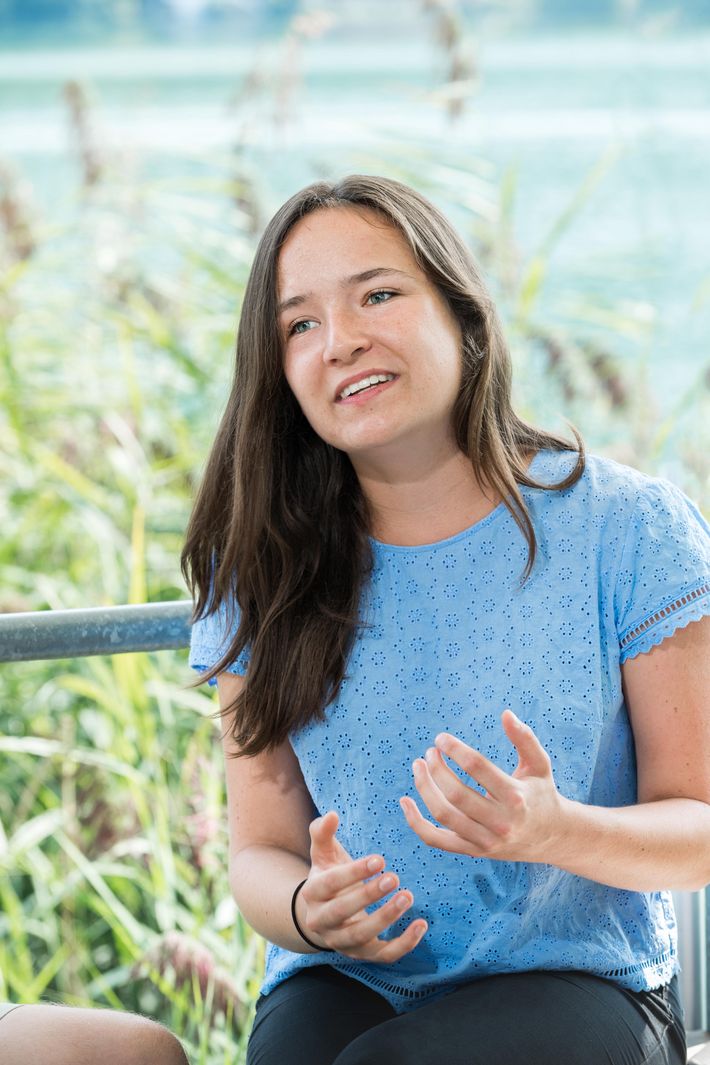News

Intellectual adventures
Studying, sitting exams and earning credit points often dominate day-to-day student life, leaving precious little time for reflection. The Swiss Study Foundation fills this gap with its summer academies, a programme that receives funding from the Werner Siemens Foundation.
In the summer academies held in Magliaso, in Italian-speaking Switzerland, gifted students have the opportunity to dedicate an entire week to exploring a single topic in an interdisciplinary group. In 2018, the topics were digital societies, determinism and free will, and reproducibility and copy. What is it that motivates students to spend their holidays at a summer academy? We asked three participants: Kai Sandbrink, Anja Meier and
Johannes Fankhauser.
You all study at excellent Swiss universities. What do the summer academies offer over and above university learning?
Johannes Fankhauser: At the academies, we can step back and take an outside perspective. In addition, the groups are made up of students from a variety of disciplines, which makes for a stimulating environment and expands the horizons of all participants.
Kai Sandbrink: I really enjoy being able to do things here that aren’t related to my studies in neuroinformatics. It has always been important to me to look beyond my own specialist area.
Anja Meier: In my academy group, for example, nanotechnologists sit alongside law students. It’s fascinating to discuss the opportunities and risks of the internet in such a diverse group. Some participants are enthusiastic advocates, while others ask critical questions about its impact on society.
There isn’t a strong connection between your university specialisations and the academies you have chosen. What, for example, do physics and free will have to do with each other?
Fankhauser: What has always really interested me about physics are the fundamental questions: What is the nature of reality? Where does everything come from? My second study programme in philosophy of physics encompasses a kind of mindset that helps us challenge established concepts in order to discover something new.
Has the summer academy provided answers?
Fankhauser: Yes, we address topics relevant to my subject area that I often contemplate, for instance, whether the world is deterministic or whether true coincidence exists. It’s easy to assume that there are simple answers to these questions. But that’s not the case at all. That’s where quantum theory exposes the limits of our knowledge.
Kai Sandbrink, you study neuroinformatics but have chosen an academy with a humanities-based topic: reproducibility and copy. What do you stand to gain from this?
Sandbrink: I can contribute certain ideas that give the discussions a new impetus. For instance, in the group we discussed metaphors used in the field of genetics—such as “linearity”—that can be understood from a literary perspective but often have a mathematical origin. The various group members had very different understandings of the models and the terminology, which I found very inspiring.
Anja Meier, how does your academy on digital societies connect to your studies in international relations?
Meier: We examined the developments in a few countries, such as Estonia and Singapore, that are front runners in digitalisation. We can learn much from these countries in regard to efficiency and mass communication. But highly digitalised countries are also exposed to risks in the areas of data protection and democratic processes. I was astounded to discover that it’s not necessarily democratic countries that are leading the way in digitalisation.
The topics at the academies are generally introduced in lectures and explored by reading set texts and holding discussions. How does this working method differ to university studies?
Meier: The academy on digital societies isn’t linear in structure. In one morning, we had a session with a historian, then a philosophical discussion with a theologian, followed by a session with an economist. This approach gives us a broad insight into a variety of aspects, and no specific outcome is defined. Instead, it provides for deep—often impassioned—discussions. In the end, it’s not possible to simply walk away with a single, clear-cut message. You have to be willing to accept that.
Fankhauser: Precisely that gives us a certain freedom. We can also get up, go for a walk and then come back—whether in our thoughts or in the beautiful grounds here.
You are all very enthusiastic about the summer academies. Do you have any qualms about the exclusive nature of the study week?
Meier: It’s certainly a fine line, but all the participants stayed very down to earth. What I find particularly rewarding is that here we can discuss abstract concepts and bizarre niche topics for hours, which isn’t possible in my day-to-day world. It’s a wonderful experience.
Is the “analogue” format of the summer academies still relevant in our digital world?
Sandbrink: Here, we can focus deeply on one topic for a whole week as a group. It’s a setting that would be very difficult to replicate in a digital environment—the distractions would be endless. It’s really something special to come together daily as a group and continue working on a topic.
Are the summer academies an ideal learning format for you, and would you like to do more in this direction?
Fankhauser: I’d have no objections, particularly as a complement to my degree programme. Time to step away from my studies and process what I’ve learned. It deepens my understanding and helps me develop new thoughts and ideas.
Meier: The level of personal interaction that we enjoy here with the lecturers is simply not possible in a university setting. I see that as a great advantage of the summer academies.
Interview: Sabine Witt
Photos: Frank Brüderli
Kai Sandbrink explores questions relating to consciousness and the brain’s functioning. A student of neuroinformatics, he spent two semesters in Hong Kong during his bachelor’s programme and will study the next semester at Tsinghua University in Peking. Afterwards, he plans to write his master’s thesis in the US. Sandbrink has multiple interests and holds bachelor’s degrees in environmental engineering and biotechnology. He is currently a Fellow of the Werner Siemens Foundation.

About the students

Johannes Fankhauser has an unquenchable thirst for knowledge about the world and nature that naturally led him to study physics. In the course of his master’s studies in physics at ETH Zurich and in the philosophy of physics at Oxford University, he discovered that theory should not be applied uncritically. Next semester, Fankhauser will commence doctoral study in fundamental physics at Oxford University. He is a former Fellow of the Werner Siemens Foundation.
Anja Meier believes the right combination of idealism and realism is essential in addressing societal issues. Her main interest lies in sustainable and high-quality international collaboration, especially in civil matters. Meier is studying international relations in Geneva and can well imagine addressing the topic of digitalisation in international relations in her bachelor’s thesis. In spring 2019, she will complete an exchange semester at St Petersburg University, Russia.
